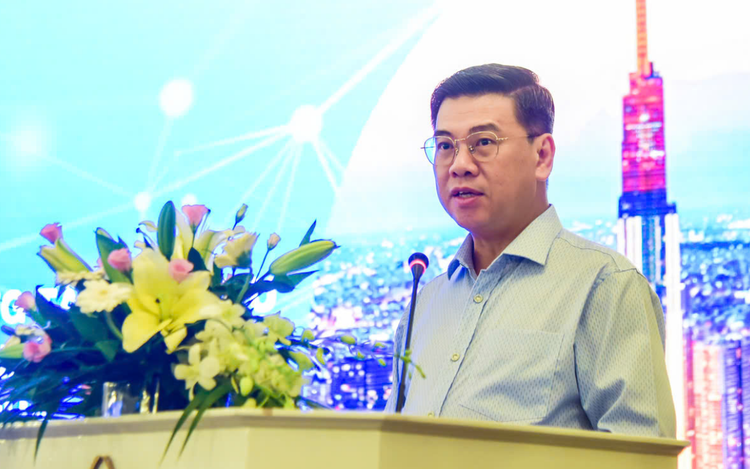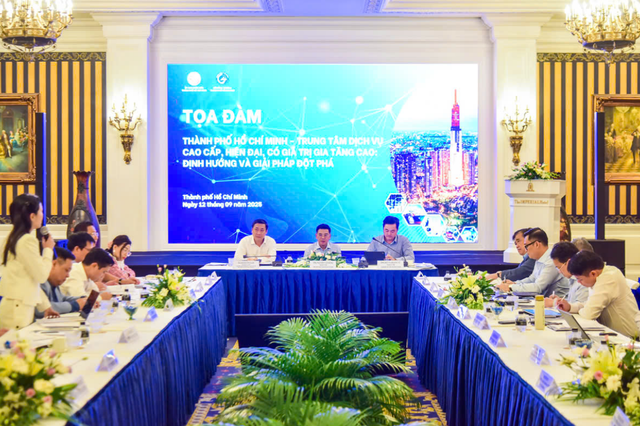
Nguyen Van Dung, vice-chairman of the Ho Chi Minh City People's Committee, speaks at a seminar, September 12, 2025. Photo: H.L. / Tuoi Tre
This call was made at a seminar on high-end service development held in Vung Tau Ward, Ho Chi Minh City on Friday.
The event brought together leading local and international experts, scientists, and business leaders.
Learning from global leaders, pursuing special mechanisms
Speaking at the seminar, Vu Doan Thai Long, senior project manager at Roland Berger Company, highlighted that the service sector's contribution to the city’s gross regional domestic product (GRDP) had risen from 40 percent in 2010 to 51 percent in 2024, overtaking the industrial sector.
However, he noted that the city still trails far behind regional service centers, where Bangkok’s service sector accounts for 88 percent of GRDP, Singapore 71 percent, and Kuala Lumpur 70 percent.
Ho Chi Minh City’s annual growth rate between 2020 and 2024 stood at 7.8 percent, surpassing both Singapore and Seoul – an encouraging sign of the city’s breakout potential.
Long pointed out several persistent challenges such as underdeveloped connectivity infrastructure, a dominance of traditional business models, a landscape dominated by small and medium-sized enterprises, and weak competitiveness.
He hinted at a regional functional zoning approach, where Ho Chi Minh City focuses on financial services, former Binh Duong Province on high-tech and transportation, and former Ba Ria–Vung Tau Province on tourism and seaport logistics.
Under the national merger strategy, which took effect on July 1, the new Ho Chi Minh City was formed by merging the city with Binh Duong and Ba Ria-Vung Tau Provinces.
Luong Quang Thi from the Ho Chi Minh Logistics Association said that among the city's 30,000 businesses, only 30 percent are engaged in logistics, an underwhelming figure given the city’s strategic location.
The city must cultivate large-scale logistics enterprises to lead and shape the market, he noted.
“Singapore is a smart logistics hub with a fully integrated, automated system. For example, pharmaceutical and food containers are given customs priority,” Thi explained.
“China's Shanghai is also a model worth studying. It establishes free trade zones as experimental labs where regulations can be tested and refined beyond traditional state constraints,” he added.
Experts at the seminar also suggested expanding the city’s core service sectors to include digital economy and vocational training services, in addition to the nine existing key service industries.
They urged the city to propose special administrative mechanisms, establish a dedicated service sector council and develop premium service brands rooted in national identity.
The city must nurture leading brands capable of forming a high-end service ecosystem.
Bui Ta Hoang Vu, director of the municipal Department of Industry and Trade, emphasized that transforming the city into a major service hub with regional and global competitiveness cannot rely solely on government efforts.
Close collaboration among firms, scientists, international organizations and the broader community is needed, he said.
The department will consolidate all expert feedback and present a comprehensive proposal to the city leadership.
“The department pledged to continue serving as a vital bridge, providing strategic advice, and coordination, and creating the most favorable conditions for the service sector to thrive sustainably and deliver high value for the city’s economy,” he underlined.

Delegates participate in a seminar on high-end service development in Ho Chi Minh City. Photo: H.L. / Tuoi Tre
High-end service sector yet to match potential
Nguyen Van Dung, vice-chairman of the municipal People’s Committee, noted that after the merger, the service sector now accounts for nearly 51 percent of the city’s GRDP.
However, the sector is still heavily reliant on traditional services, while high-value and advanced services have yet to develop in line with the city's potential and strategic advantages.
This imbalance undermines competitiveness, particularly at a time when cities across ASEAN are rapidly transitioning toward digital economies, international financial services, global logistics and innovation-driven industries, Dung said.
“The city has set its sights on becoming a globally recognized urban center and a leader in digital and knowledge economies,” he stressed.
To realize this vision, several key initiatives are being pursued, including a master plan to position the city as a major national and regional service hub.
Efforts are also underway to establish Ho Chi Minh City as an international financial center, with integration into global capital and insurance markets.
Logistics is being prioritized as a strategic economic sector, aligned with the development of major infrastructure projects such as the Cai Mep - Thi Vai seaport and an international transshipment port in Can Gio.
The city is working to boost international education and premium healthcare services to serve both domestic and global customers.
The city’s leadership affirmed that developing high-quality services is not just an economic objective but also a strategic move toward sustainable, modern urban development that reflects the city’s unique identity.


Max: 1500 characters
There are no comments yet. Be the first to comment.